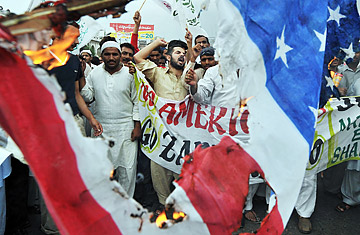
Pakistani activists shout anti-US slogans as they burn a US flag during a protest in Lahore.
There's no war going on between the U.S. and Pakistan yet, but recent exchanges involving American and Pakistani forces along the Pakistan-Afghanistan frontier are sounding like a sputtering fuse that's growing ever shorter. The latest series of "pops" occurred Thursday, when Pakistani forces fired on a pair of U.S. OH-58 scout helicopters buzzing along the border, and U.S. and Pakistani ground troops then exchanged fire. Pakistani officials insisted the choppers had crossed into their airspace, but U.S. officials said the incident occurred more than a mile inside Afghanistan — and the mountainous region is so poorly mapped that both sides likely believe what they are saying. No one was injured.
In New York, Pakistan's new president, Asif Ali Zardari, said his country's forces had fired only warning flares at the choppers. "Sometimes the border is so mixed that they don't realize they have crossed the border," he told reporters before a session with Secretary of State Condoleezza Rice. But the disquieting clash comes as U.S. forces have stepped up attacks on safe havens just inside Pakistan that have been used by militants to stage attacks on U.S. and NATO troops in Afghanistan. Just this week, Pakistan's army claimed to have found the wreckage of a U.S drone on its soil (the U.S., in another case of conflicting maps, said the drone had crashed in Afghanistan); militants blew up the Marriott hotel in Islamabad, killing 53; and the independent Army Times newspaper quoted a U.S. Marine alleging that last year the Pakistani military flew repeated helicopter resupply missions to aid Taliban fighters in Afghanistan.
But following the Thursday exchange, U.S. officials were quick to stress their desire to continue cooperating with Pakistan, even as Zardari declared "we cannot allow our territory and sovereignty to be violated by friends." While Pentagon officials were upset that the Pakistani military fired on their aircraft and were seeking an explanation, the word of the day at the Defense Department was "de-escalate." General David Petraeus, who has just stepped down as head of U.S. troops in Iraq and who in a month will become head of U.S. Central Command, which includes Iraq, Afghanistan and Pakistan, says Pakistan's very existence is threatened by the turmoil along its border with Afghanistan. "Pakistan faces a threat that certainly seems to be an existential threat," he told reporters Thursday in Paris. Echoing a growing Pentagon refrain, Petraeus likened the enemy in western Pakistan to a "syndicate" made up of "some true al-Qaeda, some Taliban, and in between different forms of extremist movements."
The problem is that Pakistan and the U.S. appear unable to agree on what role American forces will play in targeting militants on Pakistani soil. Thursday's exchange — Pakistani officials said the helicopters had returned fire, which U.S. officials denied — between U.S. forces and Washington's key ally in its war on terror highlights the tinderbox that western Pakistan has become since 9/11. U.S. forces find themselves restrained by political and diplomatic concerns from pursuing enemy targets inside Pakistan, while the loyalties of Pakistan's security forces are clearly divided. Those forces — especially the Frontier Corps that guards the border — can be crudely characterized as being pro-Taliban (the Afghan Islamist movement is based in the Pashtun ethnic group found on both sides of the border) but hostile to al-Qaeda, which is composed of foreigners. But both organizations are found in Pakistan's lawless Federally Administered Tribal Areas, where Osama bin Laden and his key lieutenants are also believed to be holed up.
While Islamabad claims to be fighting the militants, the U.S. military has grown increasingly frustrated over their use of sanctuaries in Pakistan to sustain their Afghan offensive. The U.S. has stepped up air strikes against targets in Pakistan and earlier this month, for the first time, launched a ground raid into Pakistan. The stepped up U.S. campaign has generated outrage in Pakistan, leading the army to declare it will defend the nation's sovereignty even if that means shooting at U.S. forces detected in Pakistani territory.
Despite the mounting tension, Defense Secretary Robert Gates concedes that neither the clandestine U.S. raids or the increased efforts by the Pakistani military have done much to suppress the insurgency. "If you ask me today — after the successes that we've had against al-Qaeda in Iraq — where the greatest threat to the [U.S.] homeland lies," he said Tuesday, "I would tell you it's in western Pakistan."
